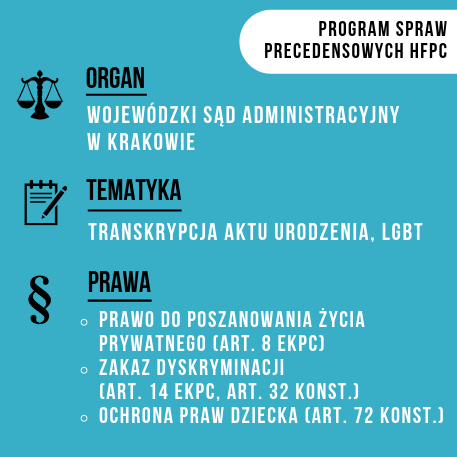
Administrative court rules on transcription of LGBT family child’s birth certificate
♦ The Provincial Administrative Court in Kraków has decided the case involving the transcription of a foreign birth certificate in which two women are listed as parents. The court ruled that the Head of a Register Office correctly implemented the decision of the Supreme Administrative Court by registering the birth certificate in the Polish civil registry records. Kraków PAC thereby dismissed a prosecutor’s office complaint against the registration. The court emphasised that registration was necessary to protect the rights of the child.
♦ In October 2018, the Supreme Administrative Court held that this kind of transcription was admissible. In effect, the Head of the registry office transcribed the child’s birth certificate. Nevertheless, a prosecutor took the view that this decision violated Poland’s ordre public and challenged the transcription before PAC in Kraków.
♦ The HFHR was a party to the proceedings and argued that a refusal to transcribe the birth certificate would violate the rights of the child.
Case history
The case concerns the entry into Polish civil registry records of a child born in the United Kingdom. The UK birth certificate lists two Polish women as parents of the child. The Head of the Registry Office in Kraków originally refused to transcribe the birth certificate, arguing that it was incompatible with fundamental principles of Polish legal order. The child’s mother challenged that decision and in October 2018 the Supreme Administrative Court ruled that the transcription of a birth certificate which identifies two mothers as parents is admissible. SAC overturned the unfavourable decision and the Head of the registry office needed to revisit the case. Finally, in December 2018, the Head of the registry office transcribed the child’s birth certificate in line with the judgment of the Supreme Administrative Court. Nevertheless, a prosecutor took the view that this decision violated Poland’s ordre public and challenged the transcription before PAC in Kraków.
In its judgment of 10 October 2018 (case no. II OSK 2552/16) the Supreme Administrative Court emphasised that a refusal to transcribe constituted a violation of children’s rights enshrined in such laws as the Constitution of the Republic of Poland, the Convention on the Rights of the Child and the European Convention on Human Rights. Referring to EU law and judgments of the Court of Justice of the European Union, SAC stated that the obligation to transcribe a birth certificate, carried out for the sole purpose of protecting rights of the child and certifying their identity, did not contravene the fundamental principles of the Polish legal system and the principles of public order. Accordingly, SAC expressly ruled that transcription of the birth certificate was admissible.
Case timeline:
⇒ 3 June 2015 – the Head of the Registry Office in Krakow refuses to transcribe the birth certificate.
⇒ 21 August 2015 – the Governor of Małopolska Province upholds the decision of the Head of the Registry Office.
⇒ 11 September 2015 – the mother files a complaint with the administrative court challenging the decision of the Province Governor.
⇒ 22 April 2016 – the Ombudsman notifies his intervention in the case.
⇒ 10 May 2016 – the Provincial Administrative Court dismisses the complaint, concurring with the argument that the transcription would violate the basic principles of the Polish legal order.
⇒ 11 July 2016 – the mother files a complaint in cassation against PAC judgment.
⇒ 9 October 2018 – the Helsinki Foundation for Human Rights requests to be admitted to intervene in the proceedings before the Supreme Administrative Court, and asks the Court to refer for a preliminary ruling of the CJEU the question whether EU law should be interpreted as precluding the refusal to transcribe a foreign birth certificate based on the contention that the certificate in question violates fundamental principles of the legal order in a given country. In this respect, the HFHR invokes the CJEU judgment delivered on 5 June 2018 in Coman (case C-673/16).
⇒ 10 October 2018 – the Supreme Administrative Court admits the complaint in cassation in its entirety, overturns PAC judgment and annuls the preceding decisions. SAC emphasises that a refusal to transcribe would constitute a violation of children’s rights enshrined in such instruments as the Constitution of the Republic of Poland, the Convention on the Rights of the Child, the European Convention on Human Rights and would be incompatible with EU law.
⇒ December 2018 – Head of a Register Office transcribes the UK birth certificate (registers it in the Polish civil registry records).
⇒ 28 January 2019 – a prosecutor with the Circuit Prosecutor’s Office in Kraków challenges the transcription in a complaint submitted to the Provincial Administrative Court in Kraków.
⇒ 4 June 2019 – the Provincial Administrative Court in Kraków rules on the prosecutor’s complaint.
HFHR intervention
♦ The HFHR has entered its appearance and intervened in the proceedings before Kraków’s PAC as a party.
♦ The HFHR submitted that it was impossible to reconsider transcription of the child’s foreign birth certificate from the public order perspective. These circumstances have been definitively clarified by SAC in the above judgment.
♦ The HFHR argued that the Head of the Registry Office and the Provincial Administrative Court in Kraków were bound by the assessment of law made by the Supreme Administrative Court. Repealing the birth record of a child would undermine the final and binding judgment of SAC, which also would be incompatible with Article 6 of the European Convention on Human Rights (which guarantees the right to a fair trial) and the principles of a democratic state ruled by law.
♦ The HFHR further argued that impeding the transcription of a foreign birth certificate must be considered as a violation of rights guaranteed by the Polish Constitution and international law, including EU law.


07.06.2019
 Cookies EN
Cookies EN